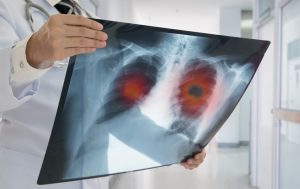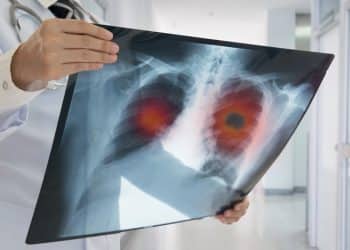
A lung cancer screening is a diagnostic process is specifically designed to detect lung cancer. One type of medical exam is regularly performed for lung cancer screening: This is low-dose computerized tomography, which you might also see referred to as an LDCT (or as low-dose CT scan.)
During this procedure, an x-ray machine is used to develop detailed diagnostic photos of the lungs. It is called “low-dose” because only a very small amount of radiation is required.
When Should You Get a Lung Cancer Screening?
Screening for lung cancer is generally only necessary for adults who combine all these factors:
- A history of heavy smoking
- Aged between 55 and 80 years old
- Currently smoke or have quit within the last 15 years
According to the Centers for Disease Control, heavy smoking is defined by as 30 or more pack years. A pack year refers to smoking one pack of cigarettes, on average, each day for a full year.
Who Makes a Good Candidate?
Someone who combines all of the risk factors listed above is considered a good candidate for an annual screening using LDCT. Existing health concerns and medications should be discussed with your doctor prior to scheduling or completing an LDCT.
It is important not to wait for lung cancer symptoms before you have screening performed.
Common symptoms of lung cancer include:
- Dull or sharp pain in the ribs or chest
- Pain which worsens while breathing
- Chronic cough, dry or with mucous
- Severe coughing that includes blood
- Recurring respiratory infections
- Wheezing or shortness of breath
Screening should be discontinued for patients who turn 81 years old, who have not smoked in 15 years, or who cannot undergo surgical treatment for lung cancer for health reasons.
As with many types of cancer screening, there is some risk of a “false positive” – symptoms that resemble cancer may be detected where no cancer exists. Because of these concerns – and the desire to minimize radiation exposure in healthy patients – screening is on a case-by-case basis.
How Do You Prepare For a Screening?
No special preparation is needed for most patients to undergo a lung cancer screening. The test requires only a few minutes and the patient can return to usual activities immediately. There are no common risks or complications beyond those associated with a small dose of radiation.
Ways to Avoid Lung Cancer
The best way to minimize lung cancer risk is to avoid smoking or discontinue smoking as soon as possible. The odds of lung cancer are substantially reduced in those who do not smoke. Even long-term smokers can curb their risk if they cease smoking.
It’s also valuable to avoid secondhand smoke whenever possible. Secondhand smoke has been shown to raise the likelihood of lung and respiratory complications, including lung cancer, in those who have never smoked.
To learn more, contact MXBowen PPC Health & Breathing Center.

